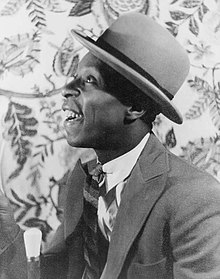
Porgy and Bess is an English-language opera by American composer George Gershwin, with a libretto written by author DuBose Heyward and lyricist Ira Gershwin. It was adapted from Dorothy Heyward and DuBose Heyward's play Porgy, itself an adaptation of DuBose Heyward's 1925 novel of the same name.
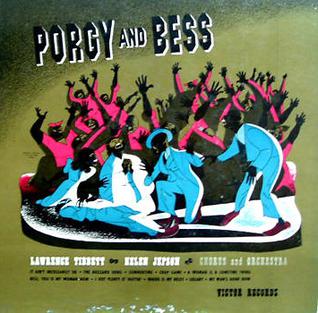
Highlights from Porgy and Bess, the 1935 album of George Gershwin's opera, was recorded just days after Porgy and Bess opened on Broadway on October 10, 1935. While the opera was performed by an all-African American singing cast, the 1935 album featured mostly white opera singers. Gershwin's involvement is clearly stated on the album cover, which reads "Recorded under the supervision of the composer."
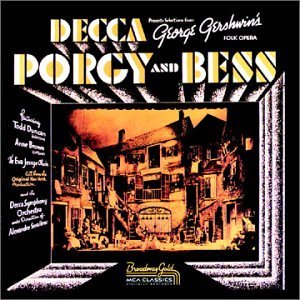
Decca Presents Selections from George Gershwin's folk opera Porgy and Bess consists of two volumes of records, the first from 1940, and the next from 1942.

Porgy and Bess is a studio album by jazz vocalist and trumpeter Louis Armstrong and singer Ella Fitzgerald, released on Verve Records in 1959. The third and final of the pair's albums for the label, it is a suite of selections from the George Gershwin opera Porgy and Bess. Orchestral arrangements are by Russell Garcia, who had previously arranged the 1956 jazz vocal recording The Complete Porgy and Bess.
Porgy and Bess, the opera by George Gershwin, has been recorded by a variety of artists since it was completed in 1935, including renditions by jazz instrumentalists and vocalists, in addition to operatic treatments.
"They Can't Take That Away from Me" is a 1937 popular song with music by George Gershwin and lyrics by Ira Gershwin. It was introduced by Fred Astaire in the 1937 film Shall We Dance and gained huge success.
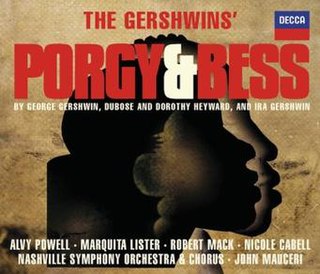
Porgy and Bess (2006), first studio cast recording directly based on the original 1935 production of George Gershwin's opera Porgy and Bess. This studio recording originated as several semi-staged performances which took place on February 24 and 25, 2006 at the Tennessee Performing Arts Center in Nashville, with Alvy Powell as Porgy, Marquita Lister as Bess, Nicole Cabell as Clara and Robert Mack as Sportin' Life. The Nashville Symphony Orchestra was conducted by John Mauceri. The recording incorporates changes Gershwin made to his original score after its first publication, which were not discovered until 1987.
"I Loves You, Porgy" is a duet from the 1935 opera Porgy and Bess with music by George Gershwin and lyrics by Ira Gershwin. It was performed in the opera's premiere in 1935 and on Broadway the same year by Anne Brown and Todd Duncan. They recorded the song on volume 2 of the album Selections from George Gershwin's Folk Opera Porgy and Bess in 1942. The duet occurs in act 2, scene 3, Catfish Row, where Porgy promises Bess that he will protect her. Bess has a lover, Crown, who is abusive and continually seduces her.

Porgy and Bess is a 1976 album by pianist Oscar Peterson and guitarist Joe Pass featuring music from George Gershwin's opera Porgy and Bess. This is the only album on which Peterson plays the clavichord.

Oscar Peterson Plays Porgy & Bess is a 1959 studio album by Oscar Peterson, playing selections from George Gershwin's 1935 opera, Porgy and Bess.

Porgy & Bess is a 1997 album by the jazz saxophonist Joe Henderson, released on Verve Records. It contains Henderson's arrangements of music from George Gershwin's opera Porgy and Bess. It was his final album as a leader.

Porgy and Bess is an album by Harry Belafonte and Lena Horne, released by RCA Victor in 1959. It features songs from George Gershwin's opera Porgy and Bess. Belafonte and Horne sing two songs together: "There's a Boat That's Leavin' Soon for New York" and "Bess, You Is My Woman Now". The album was re-issued on a 2-CD set in 2003 together with Jamaica by BMG Collectables in Stereo.
"Bess, You Is My Woman Now" is a duet with music by George Gershwin and lyrics by Ira Gershwin and DuBose Heyward. This song comes from the Gershwins' opera Porgy and Bess (1935) where it is sung by the main character Porgy and his beloved Bess. They express their love for each other and say that they now belong together.

The Modern Jazz Quartet Plays George Gershwin's Porgy and Bess is an album by the American jazz group the Modern Jazz Quartet performing the score to George Gershwin's opera Porgy and Bess recorded in 1964-65 and released on the Atlantic label.
"I Got Plenty o' Nuttin' " is a bass-baritone aria sung by the character Porgy from George Gershwin's 1935 "folk-opera" Porgy and Bess (1934). The lyrics are by DuBose Heyward, the author of the novel Porgy on which the opera was based, and Ira Gershwin. It is one of the most famous arias from the opera and it has been recorded by hundreds of singers and music groups.

Porgy and Bess is an album by American jazz pianist Hank Jones featuring interpretations of music from George Gershwin's opera Porgy and Bess recorded in 1958 for the Capitol label.

Porgy and Bess is a 1959 album by Sammy Davis Jr. of selections from George Gershwin's opera Porgy and Bess co-starring Carmen McRae. Davis is accompanied by orchestras conducted by Buddy Bregman and Morty Stevens, sometimes supported by the Bill Thompson singers. McRae is featured on three of the ten songs, "Summertime", "My Man's Gone Now" and the only duet, "I Loves You, Porgy", all three backed by an orchestra directed by Jack Pleis. "The record is piled to the sky with strings, harps, choruses, and pillowy orchestration," writes Tim Sendra on Allmusic, but "credit[s] Sammy and Carmen for holding up their end of the deal."

Toshiko Akiyoshi Plays Gershwin's "Porgy and Bess" is a 2016 recording by jazz pianist Toshiko Akiyoshi.

Porgy & Bess is an album by multi-instrumentalist Buddy Collette featuring jazz versions of music from the George Gershwin opera Porgy and Bess recorded at sessions in 1957 and released on the Interlude label in 1959.
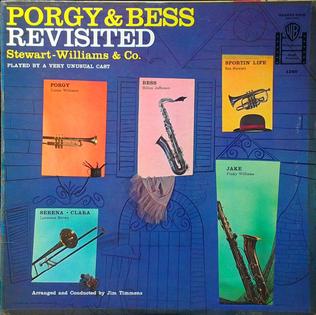
Porgy & Bess Revisited, subtitled Played by a Very Unusual Cast, is an album of jazz interpretations of songs from the George Gershwin opera Porgy and Bess performed by cornetist Rex Stewart and trumpeter Cootie Williams, with saxophonists Hilton Jefferson and Pinky Williams and trombonist Lawrence Brown, that was recorded in late 1958 and released on the Warner Bros. label.

